Six Takeaways from Songwriting Clinic with Charlie Puth
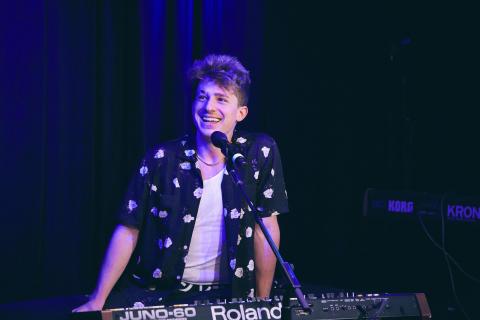
Charlie Puth B.M. '13 talks to students at the Red Room at Cafe 939.
Image courtesy of Spotify
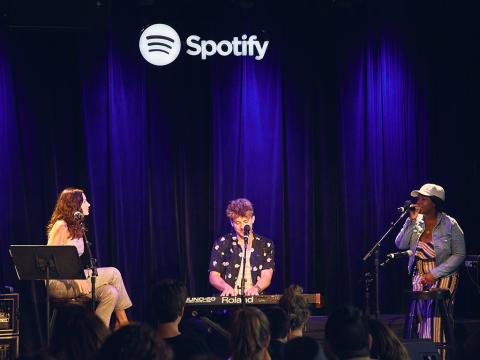
Kara DioGuardi, Charlie Puth, and student Javiya Minor workshop Minor's song.
Image courtesy of Spotify
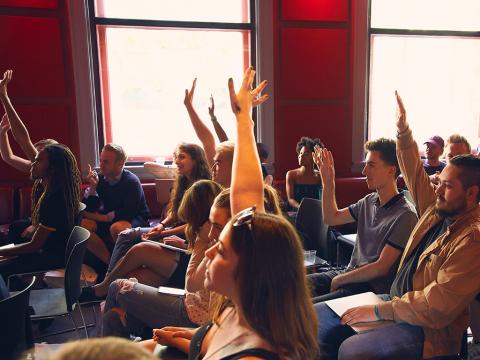
Students in the Red Room volunteer to have their songs critiqued by Charlie Puth and Kara DioGuardi.
Image courtesy of Spotify
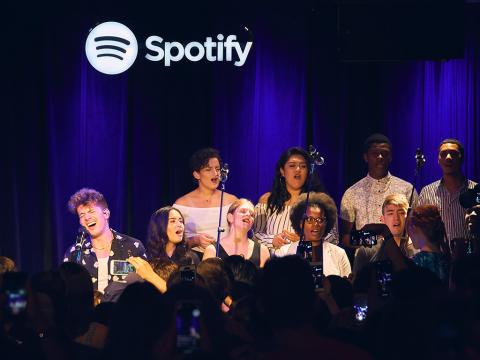
Members of Berklee a cappella group Pitch Slapped take the stage with Charlie Puth during his half-hour evening set at the Red Room.
Image courtesy of Spotify
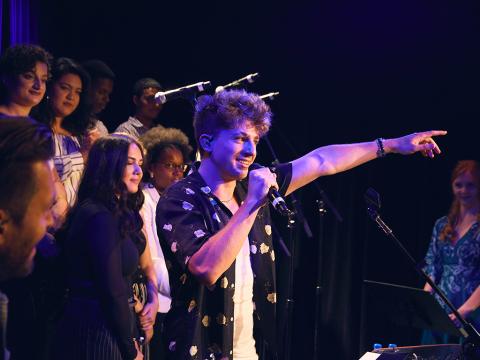
Charlie Puth B.M. '13 and members of Pitch Slapped on stage
Image courtesy of Spotify
A day after his biggest show ever, in front of 15,000 people in Toronto, Charlie Puth B.M. ‘13 returned to the first stage he played, the Red Room at Cafe 939.
In town for his Voicenotes tour, Puth stopped by Berklee on July 12 to talk with Kara DioGuardi and students about songwriting, to workshop student-written songs, and to play an evening set at the Red Room.
During their 45-minute clinic, Puth and DioGuardi covered everything from the importance of collaboration to the perils of imitating what’s hot. Here are some takeaways from that conversation.
Tell Your Truth
Puth says he first realized the importance of telling the truth in songs while taking DioGuardi’s class, Hit Songwriting, at Berklee in 2012.
“I remember you saying to me that these lyrics—it’s almost like they didn’t happen to you, it’s almost like you made it up. You experience interesting things in your life—just put melody to them,” Puth said. In fact, it was in auditioning for that class that Puth started thinking about the song that would later become "See You Again," which has 3.7 billion YouTube views.
“You can’t escape your truth,” DioGuardi said. “When something moves you like that, it is your destiny to write it. You have to write it.” The key to doing this, she says, is to check your ego at the door and to let yourself be vulnerable with your collaborators.
“Also, people have the BS sensor,” Puth added. “They really do. They know right away. It’s a human-to-human interaction… All a song is is a conversation with a couple solos in it.”
Collaborate
One more thing Puth took away from that 2012 class was that he can’t make it alone. He recalls DioGuardi telling him that he wasn’t yet a good enough producer to make great songs.
“You said if you want to grow as a singer-songwriter, producer, whatever you want to be...you have to collaborate with people,” Puth recalled, adding that he found DioGuardi’s advice humbling. But it changed his career.
“I wouldn’t have written 'See You Again' on my own. So collaboration, the thing that you said was the most important thing, ended up being the most important thing,” he later said.
“If both sexes can sing the song, that means it’s a hit record.”
-Charlie Puth
Find Your Supporters and Keep the Faith
Before coming to Berklee, Puth had heard for years that he couldn’t sing and should just stick to playing piano. It was only after he went to college and was around all his new friends that he started to sing, with their encouragement. His lesson: listen to your supporters.
Also, stay resilient and work hard, even if success is slow to come. It took Puth 10 years to get to where he is now. “This guy worked harder than everybody. And that’s why he’s sitting here,” DioGuardi said.
“It’s not in a distant future kind of thing. It can be as soon as you want it to be. But don’t get discouraged just because someone your age is killing it right now. You’re going to kill it, too,” Puth said.
Season Your Songs Judiciously
Having a secret ingredient at your disposal doesn't mean you should use it all the time, Puth said.
“Just because you have a black truffle, and it literally goes with everything—you can put it on pizza, you can put it on raviolis, you can put in on spaghetti squash, you can put it on anything you want—it doesn’t mean that it needs to be there. So I just throw the truffle in, just one. Not 100, because [of the] Law of Diminishing Returns.”
Make Your Music Accessible
Similarly, most listeners don’t have the range of Whitney Houston, but still like to sing along to songs, so make them accessible, Puth said.
“It’s all about it being easy to digest for the average, everyday listener,” he said. That means both men and women. “If both sexes can sing the song, that means it’s a hit record.”
If It Sounds Like a Hit
DioGuardi asked Puth what advice he would give to himself seven years ago, when he was a student at Berklee.
He’d go with his gut and flesh out the idea for "See You Again," he said. “I would tell myself to develop that idea that was in my head when I was walking down Newbury Street, that it’s not too simple, and that people might actually want to hear it. And that my life is interesting enough when I was in college that that heartbreak I experienced the other weekend, someone else has experienced that in maybe another way.”
And he wouldn’t worry about what’s hot, because the stuff that’s now on the radio was made a year ago.
DioGuardi agreed: “If it sounds like a hit, it’s probably not a hit, because that means that you’re doing something that’s already done before.”




